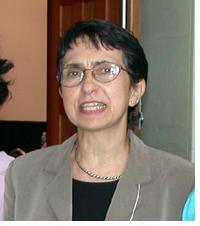
Summer 2006
Profile: Virginia LoCastro
Remembering LIOJ
Liberty and Sovereignty
Why I Write Lesson Plans
The Role of Textbooks in the ESOL Classroom
In Defense of Textbooks
Semantic, Lexical, and Thematic Sets
Summer Vacation Essay
![]()
/Index/
/Letters/
/Profiles/
/Search/
/Podcasts/
![]()
Subscribe
for free!

Virginia LoCastro
Walking the Talk
1. What is your main ESL or second-language/multicultural activity now?
I teach courses in second language acquisition, discourse analysis, and
TESL methods at the University of Florida. I do not teach language any
more. I am constantly working with students and faculty for whom
English
is not their first language
What are your principal projects?
I am carrying out a project on International Teaching Assistants and
their identity construction in the US academic community.
What is on the back burner?
A sociolinguistics study of the languages of Florida
2. How did you start your ESL related career?
I moved to Quebec City and had to teach English to speakers of French.
Who influenced your decision?
No one person. It was circumstances, including my having grown up with
a
non native speaker of English father in an area of New Jersey which was
multicultural even though that word was not used at the time. I majored
in French and had been studying it since high school. I spent my junior
year in college abroad in Paris. Being in multicultural contexts was
much more interesting to me than being in an entirely, solely "white
American" environment. Still is!
What were some important formative experiences in the early stages of your development?
It was working with Dr. John Fanselow at Teachers College, Columbia
University, in New York. And then going to Japan for what was only
going
to be two years and turned into 15 non-consecutive years.
3. What are some of the language/culture backgrounds with which you are most familiar as a teacher?
Quebecois, Japanese, general Asian, Mexican, Slavic
Which ones are you familiar with from the
perspective of a language learner yourself?
French, Quebecois, Japanese, Latin American Spanish
What insights have you gained in how to
meet the needs of learners from these
cultures and language backgrounds?
A whole book could be written on this subject. The most important
point, I guess for general consumption, is that as an ESL teacher, one
must walk one's talk, i.e. learn ANY one language well, really well.
Otherwise, one cannot understand nor does one have face validity with
the learners in the ESL/EFL classes.
4. If you had to give three pieces of advice to a new teacher, what would they be?
2. Become professional. Don't just see it as a temporary job.
3. Be creative. Know the methods, etc., but go beyond what is in the
methods books.
5. What do you see as the most important issues facing the ESL/EFL/SLA/linguistics/multicultural professions today?
The lack of full time, proper jobs, with decent pay and benefits and
the
unwillingness of most administrators to hire trained teachers. These
are two parts of the same coin, in my view.
Interview by Robb Scott
2006 ESL MiniConference Online
PDF conversion by PDF Online

Robb@ESLminiconf.net